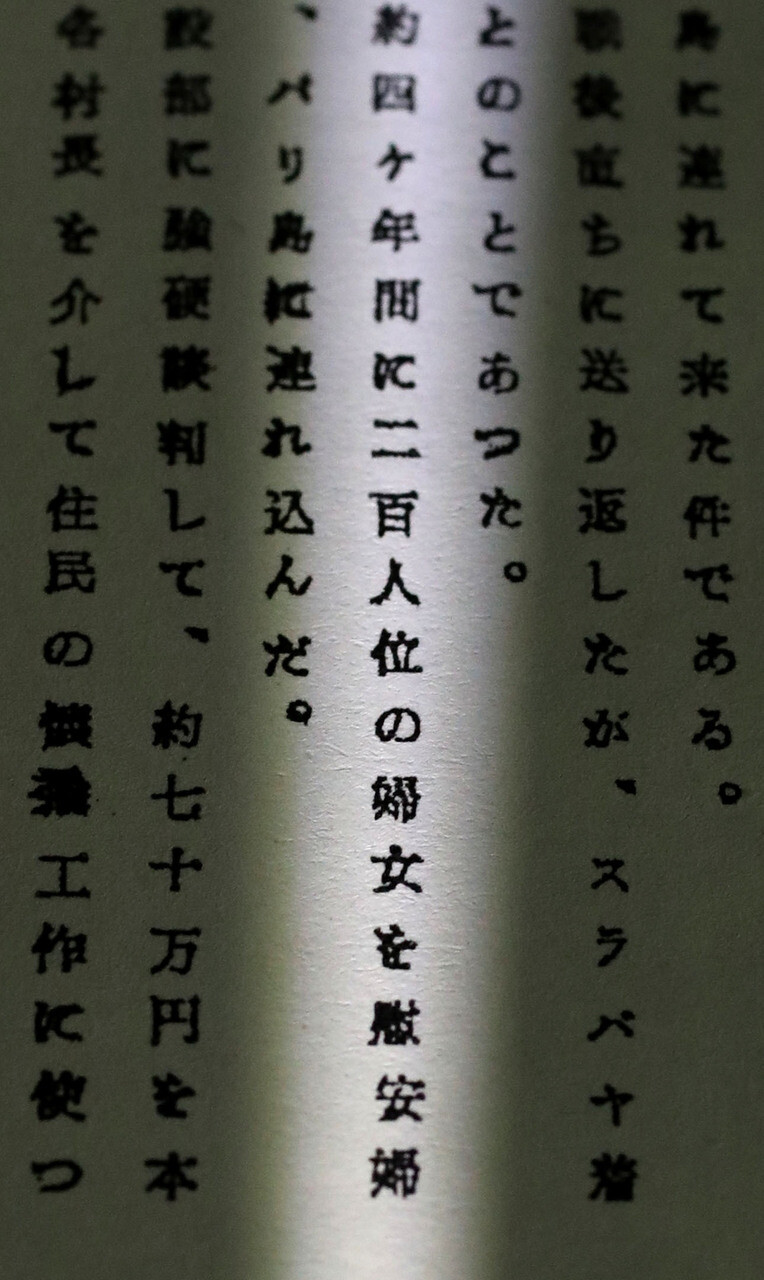hankyoreh
Links to other country sites 다른 나라 사이트 링크
More materials emerge documenting Japan’s forcible drafting of comfort women

More archival materials have been disclosed, substantiating claims that comfort women were forcibly drafted by the Japanese military. But Tokyo continues to maintain that the materials still do not prove that the women were forced into serving as sexual slaves for the military.
Kyodo News reported on Apr. 17 that the National Archive of Japan had submitted 19 official documents and 182 images to the Japanese Cabinet Secretariat (an organization overseeing planning, drafting, and coordination of major Cabinet policies) illustrating the involvement of Japanese military units in the operation of comfort stations and forcible drafting of comfort women.
The 19 documents were assembled by the Japanese Ministry of Justice from records of the Tokyo Trials and Class B and C war crime trials held after the Pacific War. They include testimony from the records of the 25th Batavia (the former name of Jakarta) Tribunal, a war crime trial held by the Netherlands, the colonial rulers of Indonesia at the time, reporting that Japanese forces took Indonesian women to Bali to have them serve as comfort women.
At one point, an Indonesian special constabulary head affiliated with the Japanese Navy during the Pacific War told a Japanese Ministry of Justice official after the war that “around 200 women were taken to Bali as comfort women on orders from the Okuyama Unit.” Indeed, a ruling in the 13th Pontianak trial held by Indonesia acknowledged that “many women were violently threatened and coerced.”
Most of the materials recently submitted to the Cabinet Secretariat were discovered by Kanto Gakuin University professor Hirofumi Hayashi, with details made public as early as the early ‘00s. In 1999, the Japanese Ministry of Justice sent the assembled documents to the National Archive of Japan. Recently, the ministry decided to transfer them to the Cabinet Secretariat after agreeing they would be necessary for a government investigation into the comfort women issue.
Hayashi said the documents “unambiguously show that the military forcibly [drafted the women] as comfort women.”
But the Japanese government remained adamant that the documents did not constitute evidence its military or government had been directly involved in forcibly drafting comfort women.
The Cabinet Secretariat said it was “aware soldiers had been found guilty of coercing [women into] prostitution,” but added, “On the whole, no accounts have been found directly showing forcible drafting.”
In 1993, the Japanese administration issued the Kono Statement, which acknowledged and apologized for coercive recruiting of comfort women by the Japanese military.
But current Prime Minister Shinzo Abe led a decision by his first Cabinet in Mar. 2007 to conclude that “no accounts have been discovered [among Japanese materials] of the direct ordering of ‘forcible drafting’ by authorities.” The argument was the coercion was not the same thing as forcible drafting. With his second Cabinet in 2014, Abe effectively nullified the Kono Statement itself, declaring it a “product of diplomacy.”
By Cho Ki-weon, Tokyo correspondent
Please direct questions or comments to [english@hani.co.kr]

Editorial・opinion
![[Column] Season 2 of special prosecutor probe may be coming to Korea soon [Column] Season 2 of special prosecutor probe may be coming to Korea soon](https://flexible.img.hani.co.kr/flexible/normal/500/300/imgdb/original/2024/0426/3317141030699447.jpg) [Column] Season 2 of special prosecutor probe may be coming to Korea soon
[Column] Season 2 of special prosecutor probe may be coming to Korea soon![[Column] Park Geun-hye déjà vu in Yoon Suk-yeol [Column] Park Geun-hye déjà vu in Yoon Suk-yeol](https://flexible.img.hani.co.kr/flexible/normal/500/300/imgdb/original/2024/0424/651713945113788.jpg) [Column] Park Geun-hye déjà vu in Yoon Suk-yeol
[Column] Park Geun-hye déjà vu in Yoon Suk-yeol- [Editorial] New weight of N. Korea’s nuclear threats makes dialogue all the more urgent
- [Guest essay] The real reason Korea’s new right wants to dub Rhee a founding father
- [Column] ‘Choson’: Is it time we start referring to N. Korea in its own terms?
- [Editorial] Japan’s rewriting of history with Korea has gone too far
- [Column] The president’s questionable capacity for dialogue
- [Column] Are chaebol firms just pizza pies for families to divvy up as they please?
- [Column] Has Korea, too, crossed the Rubicon on China?
- [Correspondent’s column] In Japan’s alliance with US, echoes of its past alliances with UK
Most viewed articles
- 1‘We must say no’: Seoul defense chief on Korean, USFK involvement in hypothetical Taiwan crisis
- 2[Column] Season 2 of special prosecutor probe may be coming to Korea soon
- 3N. Korean delegation’s trip to Iran shows how Pyongyang is leveraging ties with Moscow
- 4Amnesty notes ‘erosion’ of freedom of expression in Korea in annual human rights report
- 5Korea sees more deaths than births for 52nd consecutive month in February
- 6[Reportage] On US campuses, student risk arrest as they call for divestment from Israel
- 7[Editorial] New weight of N. Korea’s nuclear threats makes dialogue all the more urgent
- 8‘Weddingflation’ breaks the bank for Korean couples-to-be
- 9Division commander ordered troops to enter raging flood waters before Marine died, survivor says
- 10[Editorial] Korea’s surprise Q1 growth requires objective assessment, not blind fanfare